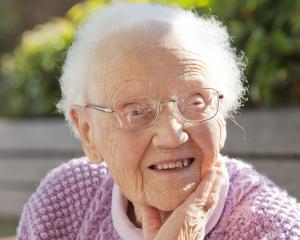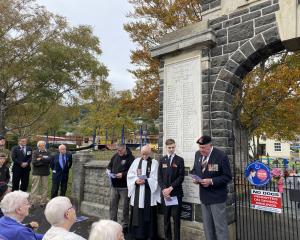He was a dispatch rider in the Middle East and Italy, dodging frontline fire to deliver messages for such military leaders as Generals Bernard Freyberg and Howard Kippenberger.
It was a high-risk job.
Of the 25 riders he served with, only five survived.
He was also a counterintelligence special agent "ferreting out" the German battle plans and devising ways to thwart them.
Mr Hedges, who turns 90 next week, remembers the events of 65 years ago as though they were yesterday.
"We were too bloody close to the Germans at times. Once, in Cairo . . . the Arabs hid us under goatskins inside a compound and the Germans were only about 100 yards [30m] away.
"But we were never discovered."
Discretion was paramount.
As far as Mr Hedges' 20th Armoured Regiment colleagues were concerned, when he was absent from dispatch duties he was away on motorcycle training courses.
"Nobody was allowed to know what we were up to. Even when I got home, my wife Dorothy didn't know the things I had done.
"If anyone had found out I would have been on the German wanted list."
Mr Hedges' undercover experience also led to him being made part of the special protection squads for the visits of British prime minister Winston Churchill and foreign secretary Anthony Eden.
Puffing on his trusty pipe - he has smoked one since 1938 - he sums up his counterintelligence role: "You had to have an inquiring mind and you had to be a bit clued up.
"You had to see . . . a problem and come up with a way of solving it."
Life in the Middle East and Italy was tough.
Malaria continued to dog Mr Hedges for several years after his return to New Zealand, as did circulation problems attributed to working in Italy's winters and hearing loss from being close to exploding shells.
He was also seriously wounded twice.
The first time was when a long-range artillery shell exploded in front of his party, sending shrapnel through his shoulder and leg.
The second time, he was almost blown up.
"A few of us [in the counterintelligence squad] were trying to get across a three-quarter mile [1200m] of open space next door to Cassino ... in Dingo Scout cars.
"We were under fire from the Germans, who had an observation post at the top of the mountain.
"More than one shell exploded near me. I don't remember any more. I was unconscious.
"When I woke up I was back at technical HQ [headquarters]."
While he had survived, it was a close call, he recalls.
"I had all my arms and legs, but I only had half my pipe."
After being demobbed in 1945, Mr Hedges returned to his home town of Dunedin.
He worked as a real estate agent in Invercargill and Dunedin before retiring at the age of 74.
Despite ongoing health issues since the war, Mr Hedges only began receiving a war pension about four years ago after Dunedin RSA welfare officer Maggie Brownlie helped him fill in the application forms.
The decades without a pension is something which now makes Mr Hedges "bloody annoyed".
"My health was all right, apart from a few aches and pains. But I could have got a pension earlier if I had known what I was eligible for. It was never mentioned, and that's what gets me."
He compares that to the ease with which single parents can obtain benefits.
"I'm not swiping at solo mothers or the benefits they get, but when you look at how easy it is for them to get a benefit compared to veterans, it's not fair."
Mr Hedges, a member of the RSA for 63 years, is full of praise for Dunedin RSA stalwarts John Campbell and Fred Daniel, who he says have done more for veterans in the past 10 years than helpers of his own generation.
Now Mr Hedges receives a 100% war pension on top of his retirement pension.
It is not a fortune, he says, but is enough to "help him along" with everyday expenses.

"I got some trees pruned a while ago and that was $500, so it helps with things like that.
"But it's not a lot. You still have to watch what you're spending."












